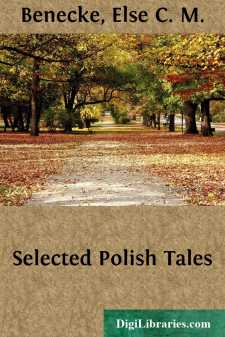Categories
- Antiques & Collectibles 13
- Architecture 36
- Art 48
- Bibles 22
- Biography & Autobiography 813
- Body, Mind & Spirit 142
- Business & Economics 28
- Children's Books 15
- Children's Fiction 12
- Computers 4
- Cooking 94
- Crafts & Hobbies 4
- Drama 346
- Education 46
- Family & Relationships 57
- Fiction 11829
- Games 19
- Gardening 17
- Health & Fitness 34
- History 1377
- House & Home 1
- Humor 147
- Juvenile Fiction 1873
- Juvenile Nonfiction 202
- Language Arts & Disciplines 88
- Law 16
- Literary Collections 686
- Literary Criticism 179
- Mathematics 13
- Medical 41
- Music 40
- Nature 179
- Non-Classifiable 1768
- Performing Arts 7
- Periodicals 1453
- Philosophy 64
- Photography 2
- Poetry 896
- Political Science 203
- Psychology 42
- Reference 154
- Religion 513
- Science 126
- Self-Help 84
- Social Science 81
- Sports & Recreation 34
- Study Aids 3
- Technology & Engineering 59
- Transportation 23
- Travel 463
- True Crime 29
Selected Polish Tales
Categories:
Description:
Excerpt
My friend the late Miss Else C. M. Benecke left a number of Polish stories in rough translation, and I am carrying out her wishes in editing them and handing them over to English readers. In spite of failing health during the last years of her life, she worked hard at translations from this beautiful but difficult language, and the two volumes, Tales by Polish Authors and More Tales by Polish Authors, published by Mr. Basil Blackwell at Oxford, were among the first attempts to make modern Polish fiction known in this country. In both these volumes I collaborated with her.
England is fortunate in counting Joseph Conrad among her own novelists; although a Pole by birth he is one of the greatest masters of English style. The Polish authors who have written in their own language have perhaps been most successful in the short story. Often it is so slight that it can hardly be called a story, but each of these sketches conveys a distinct atmosphere of the country and the people, and shows the individuality of each writer. The unhappy state of Poland for more than 150 years has placed political and social problems in the foreground of Polish literature. Writers are therefore judged and appraised by their fellow-countrymen as much by their patriotism as by their literary and artistic merits.
Of the authors whose work is presented in this volume Prus (Aleksander Glowacki), the veteran of modern Polish novelists, is the one most loved by his own countrymen. His books are written partly with a moral object, as each deals with a social evil. But while he exposes the evil, his warm heart and strong sense of justice—combined with a sense of humour—make him fair and even generous to all.
The poignant appeal of Szymánski's stories lies in the fact that they are based on personal experiences. He was banished to Yakutsk in Siberia for six years when he was quite a young man and had barely finished his studies at the University of Warsaw, at a time when every profession of radicalism, however moderate, was punished severely by the Russian authorities. He died, a middle-aged man, during the War, after many years of literary and journalistic activity in the interest of his country. Neither he nor Prus lived to see Poland free and republican, an ideal for which they had striven.
Zeromski is a writer of intense feeling. If Prus's kindly and simple tales are the most beloved, Zeromski's more subtle psychological treatment of his subjects is the most admired, and he is said to mark an epoch in Polish fiction. In the two short sketches contained in this volume, as well as in most of his short stories and longer novels, the dominant note is human suffering.
Reymont, who is a more impersonal writer and more detached from his subject, is perhaps the most artistic among the authors of short stories. His volume entitled Peasants, from which the two sketches in this collection are taken, gives very powerful and realistic pictures of life in the villages.
Kaden-Bandrowski is a very favourite author in his own country, as many of his short stories deal with Polish life during the Great War. In the early part of the War he joined the Polish Legions which formed the nucleus of Pilsudski's army, and shared their varying fortunes. During the greater part of this time he edited a radical newspaper for his soldiers, in whom he took a great interest. The story, The Sentence, was translated by me from a French translation kindly made by the author.
Mme Rygier-Nalkowska, who, with Kaden-Bandrowski, belongs to the youngest group of Polish writers, is a strong feminist of courageous views, and a keen satirist of certain national and social conventions....


